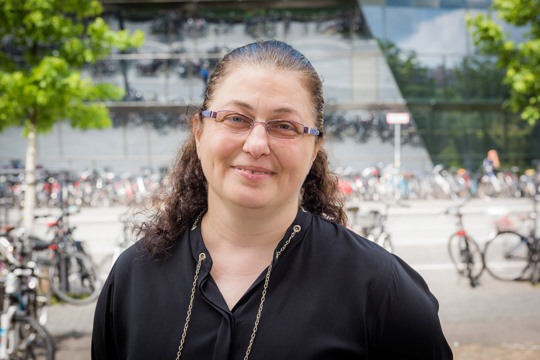Turkish for beginners
Freiburg, Jun 18, 2018
With over three million Turks living in Germany, Turkish is the second most spoken language in the Federal Republic next to German. Worldwide over 200 million people speak the language either as their native tongue or second language. Turkish has a lot of similarities to Finnish and Hungarian. All three are agglutinative languages that can express the content of a whole sentence through a word’s suffix. In a series on seldom-learned languages, Christine Hohlbaum talked with the lecturer Maide Akin about the advantages and misunderstandings of the language.

Maide Akin was a school teacher in Istanbul. She has been teaching Turkish to children of Turkish origin in Germany for the Turkish consulate since 2009. She started teaching at the Language Teaching Centre at the University of Freiburg in 2015. Photo: Klaus Polkowski
Ms. Akin, why is Turkish considered one of the seldom-learned languages?
Maide Akin: Most of the course participants in Freiburg learn the language for personal reasons because they have met someone from Turkey or want to study there with the ERASMUS program. If you look at the global statistics, however, they tell a different story: Turkish is a widely spoken language. Over 200 million people can speak Turkish worldwide, either as their native or second language. Linguistic minorities exist, for instance, in Macedonia, Rumania and Kosovo.
What are some of the reasons people should learn Turkish?
There is a nice saying in Turkish: “One language is one person. Two languages are two people.” If you learn a new language, you not only learn the words, but you also get to know the country’s culture. Both are possible through food, for instance. Every term I do a Turkish day in which I prepare food for the course participants, such as baklava or borek. We eat together, watch a film about Turkish culture and enter into a dialogue that way. Hospitality is a very large part of the culture.
Which Turkish expression should everyone learn?
There are two expressions everyone should know. If you want to show your gratitude, you should say “Eline Sağlık” (Thank you for your work, you did a good job). The second expression is used a lot in every day life: “İnşallah.” That means “hopefully” or “From your lips to God’s ear.” As you can see, you can use just one word in Turkish to say what you need multiple words for in English. It has to do with the language’s grammatical structure.
What is your favorite word?
The idiom “Yolun açık olsun” is a type of congratulatory expression. You use it when a person is saying goodbye and you want to wish him good luck and that all his wishes come true.
Which Turkish expression do you miss in German?
The word “kısmet” means having a good partner or “fortune”. You use it when two people have found one another. But it can also mean “destiny”. As you can see with this example, cultural context is very important. There is no appropriate German equivalent to it.
Which Turkish word best describes the University of Freiburg and what does it mean?
“Akvaryum” (aquarium) is a great characterization because there are so many different creatures in an aquarium. So many different people gather at the University of Freiburg: professors, staff members and students from around the world. So many cultures intersect here. University life is very exciting and constantly in motion.
Language Teaching Centre
The Language Teaching Centre (SLI) at the University of Freiburg offers courses in more than 20 languages that are open to all students, staff and University guests along with the general public.
Course offerings and registration

